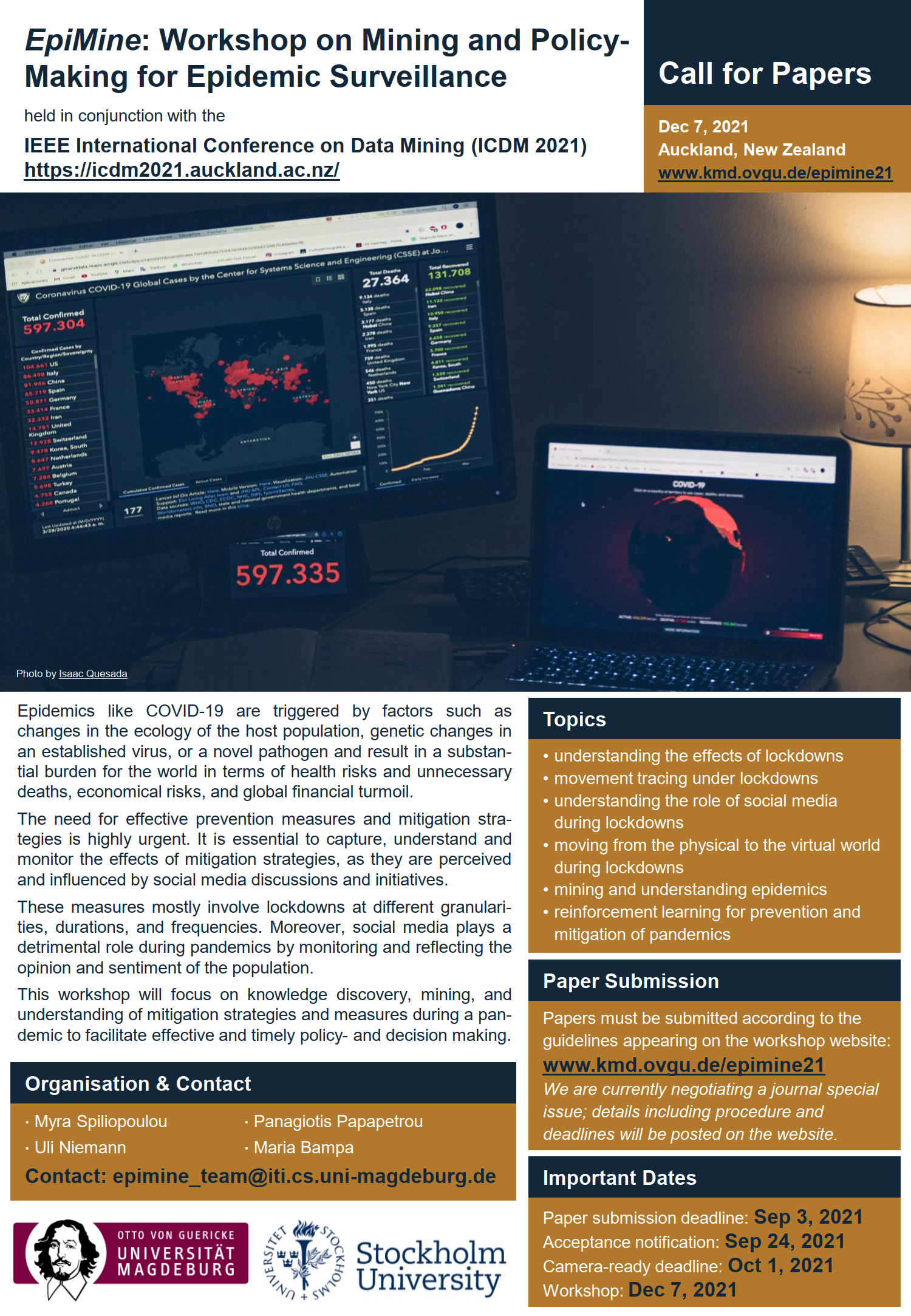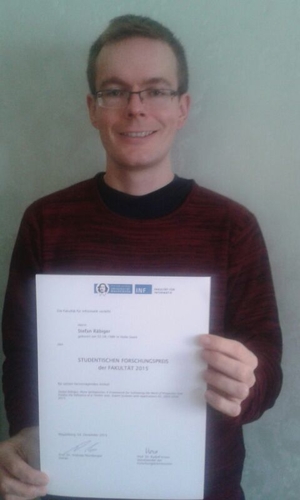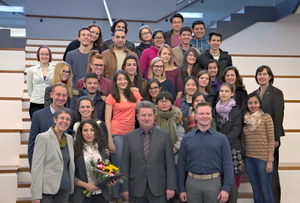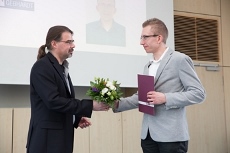News
Tutorial at PAKDD 2016, Auckland, New Zealand
Myra Spiliopoulou gives a tutorial on "Medical Mining" at PAKDD 2016, Auckland, New Zealand, together with Ernestina Menasalvas (Univ. Polytecnica de Madrid) and Pedro Pereira Rodrigues (Univ. Porto) on April 2016.
Studentischer Forschungspreis 2015
Stefan Räbiger is the recipient of the award "Studentischer Forschungspreis 2015" for the paper "A Framework for Validating the Merit of Properties that Predict the Influence of a Twitter User", which was co-written by Prof. Myra Spiliopoulou. It was awarded by the faculty of Computer Science of the Otto-von-Guericke University. The paper is based on his master's thesis which was also supervised by Prof. Spiliopoulou.
MDigiEng student receives OvGU-Stipendium
Mrs. Nedime Tugce Habip, student of the Master Digital Engineering, is the recipient of the 2015 award "Otto-von-Guericke-Stipendium". The city of Magdeburg gives this award since 2003 to international students with excellent academic performance and social engagement. Next to her superior performance in her studies, Mrs. Habip engages in mentoring international students from the Master Digital Engineering and Master Data & Knowledge Engineering degrees and in further social activities in the University and in our city. Mrs. Habip was nominated by the studies coordinator of the Master Data & Knowledge Engineering, Prof. Myra Spiliopoulou.
Student Reseach Award for Uli Niemann
The faculty of computer science Magdeburg has awarded KMD staff member Uli Niemann the faculty's 2014 Student Research Award for the article
U. Niemann, H. Völzke, J.-P. Kühn, and M. Spiliopoulou. Learning and inspecting classification rules from longitudinal epidemiological data to identify predictive features on hepatic steatosis. Expert Systems with Applications, (41)11:5405-5415, Elsevier BV, September 2014.
The article was written within the frame of scientific individual project during Uli's Master study of Business Information Systems and employs data from the Study of Health in Pomerania (SHIP). This work is a cooperation of the KMD research lab with the University Medicine Greifswald.
The prestigious journal Expert Systems with Applications (ESWA) from Elsevier emphasises on artificial intelligence and machine learning methods with a special focus on challenging practical applications. The article was submitted on 25.10.2013 and accepted on 20.02.2014. ESWA has an Impact Factor of 1.965 (2013) and a Five-Year Impact Factor of 2.254.
Tutorial @ PAKDD 2013
Myra Spiliopoulou and Georg Krempl will present a Tutorial on Mining Multiple Threads of streaming Data at PAKDD 2013, April 14-17, Gold Coast, Australia.
Stream mining is a mature area of research. However, several applications that require adaptive learning from evolving data do not seem to fit to the conventional stream mining paradigm. For example, a bank grants loans to customers and uses their data for model learning; the label (loan-payed-back YES or NO) arrives some years later, though, during which years the market may have changed drastically. Is this a stream mining problem? How many streams are there? We can distinguish between the stream of customers and the stream of their labels, which arrive with a time lag of years.
As another example, a hospital monitors patients with chronical diseases that come (ir)regularly to the hospital and undergo different tests; the streams of medical recordings and of signals (EEG, fMRI) can be used for learning. The hospital wants to learn a model on how the patients' health evolves in response to the disease and to medications. This problem seems completely different from the previous one, albeit streams of data are there in both cases.
In this tutorial, Myra Spiliopoulou and Georg Krempl bring together research advances on model learning and adaption for dynamic applications that collect and analyze different sources of dynamic data. In the introductory part of the tutorial, they present the classic stream mining paradigm and summarize the challenges being investigated in the state-of-the-art research.
EpiMine Workshop @ ICDM 2021
Prof. Myra Spiliopoulou and Uli Niemann are organizing a workshop on "Mining and Policy-Making for Epidemic Surveillance" (EpiMine), together with Prof. Panagiotis Papapetrou and Maria Bampa from the University of Stockholm, Sweden.
The goal of EpiMine is to promote research in the areas of knowledge discovery, data mining, and policy-making that contribute to the realization and further development of effective and timely prevention measures and strategies to contain epidemics such as COVID-19.
The workshop will be held on 07 December 2021 in conjunction with the IEEE International Conference on Data Mining (ICDM) in Auckland, New Zealand.
More information on the workshop's webpage.

Last attempt oral exams: ITO, WMS, DM4BA, DM I, DM II, Recommenders
The dates for the LAST ATTEMPT exams in DM4BA, DM I, DM II, Recommenders, ITO, and WMS are:
- July 21, 13:30-16:30
- Sept 7, 13:30-16:30
NOTE: Last attempt exams are offered exclusively for degrees that prescribe a last attempt, and state that this attempt must be an oral exam.
The next slots for last attempt exams will be offered after the teaching period of winter term 2021/2022.
Important announcement regarding registration process:
In order to stay more compliant to the social distancing guidelines, the registration for the exam will be conducted slightly differently.
- Download, print, and fill out the examination registration form from the examination office. Fill all fields except the date and time.
- Submit the document to Mr. Knopke electronically.
- The next available time slot will be assigned to you, and Mr. Knopke forwards the updated form to the examination office. You will be informed about the date and time for your exam.
Please note that the registration must be at least 14 days before the exam.



